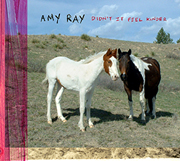GrooveOut: Ray of Light

On her third solo album, Didn’t It Feel Kinder (Daemon Records), the Indigo Girls’ Amy Ray stepped outside of her comfort zone. She enlisted a producer for the first time, Greg Griffith (The Butchies, Le Tigre), stretched her vocal range, structured even more complex harmonies, and worked with a brand-new “guest” band, Arizona (“They’re like a cross between Led Zeppelin and The Shins, and throw in some Judy Garland, too,” says Ray of the Asheville, NC-based outfit). That said, fans of previous efforts Prom and Stag will find plenty of punk-inspired, guitar-soaked, ultra-melodic indie rock (featuring turns from ex-Butchies Kaia Wilson and Melissa York) with lyrics both personal and political.
Currently at work on two new Indigo Girls albums with creative partner Emily Saliers—one recorded live, the other a studio effort with producer/player Mitchell Froom—and enjoying an LTR with filmmaker Carrie Schrader, the Georgia-based Ray took time out to discuss Kinder, fellow Georgian Michael Stipe, and whether she has a gambling problem.
Lawrence Ferber: While making this album you were purposely pushing yourself, but did you end up pushed even further than you set out to?
Amy Ray: Yeah, probably. Emotionally. I hadn’t worked with a producer on a solo level before and it felt very hard. It went against my solo mindset, doing whatever I want to do. And he made me reach a little deeper, stretch a little bit, and question some stuff. Our chemistry is pretty intense. We didn’t have drop-down, drag-out fights, but we had some fireworks between us, and in the end I think we worked together pretty well. And I think he’s an amazing instrumental player, arranger, producer, and I always said that even when arguing with him!
 You’ve extensively delved into gender, coming out, and sexual identity on your previous solo efforts. How queer of an album is this one lyrically?
You’ve extensively delved into gender, coming out, and sexual identity on your previous solo efforts. How queer of an album is this one lyrically?
Well, I’m so queer, so everything I do is informed by that to a degree. I’ve been through two records where I explored all these ideas about gender, and it’s just part of my language now. Things are integrated into me in a way, so this record became more accessible on some levels.
Incidentally, how did you feel when Michael Stipe came out and clarified, once and for all, that he’s gay in SPIN magazine earlier this year?
He did that? I wonder what took him so long, but I feel really good about it! [Laughs] I love him. He’s such a private person that I think you can’t underestimate how much privacy had to do with that decision. But I’m really glad and feel like he can be himself and have the relationships he wants. It’s awesome.
Which song is the most personal?
They really all are, but probably “Stand and Deliver.” “Rabbit Foot” is really personal, but “Stand” is in some ways the most confessional about my own feelings of inadequacy. It’s always fun to be self-deprecating.
Is “She’s Got to Be” a love song?
Yeah. It’s two things—a love song for my partner, and also a love song to the part of myself that is a woman. I’ve been with her five years. I pretty much write a lot about my undying affection. But having said that, when I’m writing anything, I’m conflating a lot of things together. I’m also taking into consideration other relationships or other people’s relationships I see. I even flip around things and write from my partner’s perspective about me.
You express some thoughts and imagery about global warming on “Bus Bus.”
Yeah, I like to include that in everything. It’s a way to mark the passage of time, I think. Like look how when I was young I wasn’t thinking about melting ice caps.
“Who Sold the Gun” was inspired by the Virginia Tech shootings—can you talk about that?
When that happened, it was just shocking to me, and I felt this mixture of anger at the shooter and also compassion for him and his family. Everything piled together, and I thought it was really ironic that as the media coverage went on, the coverage of the war started mingling with it and it became this weird statement: there’s this war where all these people are being killed every day, and we’re making all these bombs and landmines, and you can’t help but think that someone who is already mixed up isn’t going to be informed by all that. The song was a comment on “No wonder this guy’s so screwed up—look what he came from.”
I understand that you wrote a lot of these songs at the Mohegan Sun casino complex. So are you more into Poker or one-armed bandits? Is there an addiction going on here?
[Laughs] I don’t gamble at all. I don’t get anything out of it, so I don’t do it. The Indigos performed four shows in a row [there], and we had an extra day off, so I stayed in my room, set up my tape machine, and just wrote. But I like the casinos run by [Native American] tribes. They’re a little bit easier to handle for me, and they’ve got a lot of environmental stuff within the confines of their casino to make it run. They’re very eco-conscious.
One of the players on the album, guitarist Tomi Martin of Three5Human, has worked with Madonna. Did he share any Madge gossip?
No. Tomi went on tour with her and played guitar, and he only said good things about her. But I definitely plied him for information, and he won’t give it up!
Are you of the school that Madonna is hot?
I am, actually. I can’t help it. Always have been. I just think she’s a really creative… I think of her as more of a business person than anything else. And I think she’s sexy.
Has Fred Phelps ever come to an Indigo Girls or Amy Ray show?
Fred hasn’t, but he’s certainly sent his people. We were at a South Carolina college show and a bunch of his people came. We were doing like a Q&A and talking to students, and Phelps’ people were there. We always have protestors in Seattle. I don’t know why.
Did they at least buy a ticket?
No, they stand outside as people come in.
You co-founded indie label Daemon Records, and Indigo Girls are no longer attached to a big label. Now that gas is so expensive [this interview took place this past summer], will indie bands be able to tour anymore?
I don’t know… you gotta get a smaller vehicle, take up collections for gas money. I’m not sure what to do.
Lawrence Ferber, who reports each year from the Sundance Film Festival for OutSmart, is a New York-based journalist.











Comments